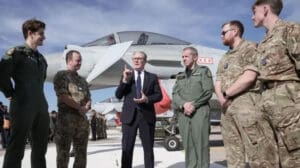The UK has sealed an £8 billion defence export agreement to supply 20 Eurofighter Typhoon jets to Turkey, marking Britain’s biggest fighter jet sale in almost two decades and a major boost for the nation’s defence manufacturing sector.
Prime Minister Sir Keir Starmer, who signed the agreement in Ankara on Monday alongside President Recep Tayyip Erdoğan, hailed it as “a win for British workers, a win for our defence industry, and a win for NATO security.”
The contract — finalised after months of high-level diplomacy — is expected to support 8,000 jobs across the UK, securing production at BAE Systems plants in Warton and Samlesbury, Lancashire, as well as roles at Rolls-Royce in Bristol and suppliers across Scotland and the South West.
“This is a landmark moment,” Sir Keir said. “I’m proud that British Typhoons will form a vital part of the Turkish Air Force for many years to come, defending NATO’s south-eastern flank for the good of all of us.”
The Eurofighter Typhoon, jointly developed by the UK, Germany, Italy and Spain, remains one of the world’s most advanced multi-role combat aircraft. Roughly 37% of each aircraft is built in Britain, with the final assembly carried out by BAE Systems.
The government said the order — the first new Typhoon export since 2017 — would “keep British production lines running long into the future” and deliver billions in value to the wider economy.
John Healey, Defence Secretary, called it “the biggest jets export deal in a generation,” adding: “It will pump billions of pounds into our economy and sustain high-skilled engineering jobs for years to come.”
BAE Systems CEO Charles Woodburn welcomed the announcement, describing it as “the start of a new chapter in our longstanding relationship with an important NATO ally.”
He added: “Investment in defence doesn’t just strengthen security — it fuels significant economic growth, innovation and supply chain resilience across the UK.”
The deal comes at a time when NATO is seeking to reinforce its southern and eastern defences amid continued instability in the Middle East and tensions with Russia.
For Turkey, the acquisition represents a significant upgrade to its air force capabilities after the country was ejected from the F-35 programme in 2019 due to a dispute over its purchase of Russian missile systems.
President Erdoğan described the deal as “a new symbol of the strategic relations between Turkey and Britain,” signalling closer bilateral defence cooperation and alignment on NATO priorities.
The partnership also strengthens the UK’s position as a key defence supplier to Ankara, with both nations collaborating on energy, trade, and regional security issues.
The first jets are expected to be delivered in 2030, with the agreement including an option for additional aircraft. The order follows a preliminary agreement signed in July for up to 40 Typhoons, with the first tranche now formally confirmed.
The Typhoons will be produced in partnership with the Eurofighter consortium, requiring approval from all four member nations — the UK, Germany, Italy, and Spain — before delivery.
The aircraft will be equipped with next-generation radar and avionics developed by Leonardo UK and MBDA, the missile manufacturer behind the Meteor and Brimstone systems.
The UK aerospace and defence industry, worth over £24 billion annually, supports more than 130,000 jobs nationwide. The Typhoon programme alone sustains around 20,000 highly skilled roles, including 9,000 within BAE Systems.
The government said the deal underscores its commitment to using defence exports as a lever for industrial growth, supporting the “Buy British, Build British” agenda and enhancing the UK’s reputation as a global defence exporter.
The £8bn package will directly support:
• 6,000 jobs in Lancashire at BAE Systems’ Warton and Samlesbury plants
• 1,100 jobs in the South West, including at Rolls-Royce Bristol
• 800 jobs across Scotland in the supply chain
The order will also bolster smaller subcontractors in the UK’s aerospace sector, from precision engineering firms to electronics manufacturers.
The agreement with Turkey follows renewed efforts by the UK to expand its defence export footprint. It builds on previous Typhoon deals with Qatar, Saudi Arabia and Kuwait, and complements partnerships on the Global Combat Air Programme (GCAP) with Japan and Italy.
Defence analysts say the Turkish order could help maintain Typhoon production through the next decade while bridging the transition to the sixth-generation Tempest fighter jet, due to enter service in the 2030s.
Dr. Alex Walmsley, defence analyst at RUSI, said: “This deal is hugely significant for sustaining Britain’s aerospace industrial base and export credibility. It also signals a deepening of UK–Turkey ties at a strategically important moment for NATO.”
The Ankara signing marks Sir Keir Starmer’s first official visit to Turkey as prime minister and a major early success in his foreign policy agenda.
Officials said the deal demonstrates “Global Britain in action” — marrying industrial strength with international diplomacy to project both economic and strategic influence.
As the UK prepares to deliver the aircraft by the end of the decade, the Typhoon deal stands as one of the most visible symbols of Britain’s renewed push for export-led industrial growth and defence collaboration.
Read more:
UK secures £8bn Typhoon fighter jet deal with Turkey in major export breakthrough

